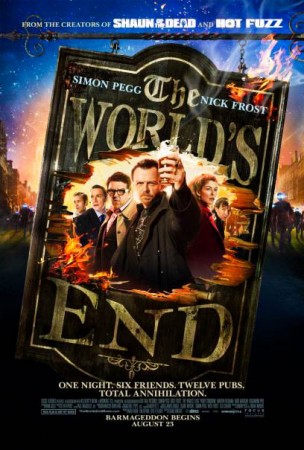
Edgar Wright is a master of sophistication. Now, to some with knowledge of his brilliant body of work, this claim might seem odd. Still, Wright is adept at taking schlocky, often B-Movie genres—zombie films in “Shaun of the Dead,” buddy cop films in “Hot Fuzz,”and rock films in “Scott Pilgrim vs. The World”—and turning them on their head, often with hilarious results. “The World’s End,” Wright’s third outing with actors Simon Pegg (who co-wrote the film) and Nick Frost, continues this formula, but with a surprisingly different outcome. Here, Wright has built his most profound, thought-provoking film wrapped up in a deftly hilarious, utterly ridiculous package.
The premise, like that of the rest of the films in the Wright canon, is somewhat simple: five middle-aged friends—Gary (Simon Pegg), Andy (Nick Frost), Peter (Eddie Marsan), Oliver (Martin Freeman), and Steve (Paddy Considine)—reunite in their childhood town to complete a pub crawl. Yet everything is not what it seems, and with each new bar, the mystery unravels and the action begins. The genius here is what Wright does with the premise, building a fully realized world into two hours. Saying much more about the film’s plot would spoil just how far Wright can adeptly take a somewhat tired premise and make it his own.
Of course, Wright’s frenetic style is part of what makes the film so uniquely engaging. From the first frame,“The World’s End” moves fluidly and rapidly in more ways than one. Jokes come at breakneck speed, Wright’s dry sensibilities always hitting their mark. While the film certainly has something to say, it never takes itself too seriously, staying jokey and witty even in its heaviest moments.
Wright’s trademark editing style, characterized by smash cuts that often function as jokes in their own right (using flowing beer taps as transitions, for example), only add to the film’s charm. Even the plot never takes a pit stop; the film opens with a montage that introduces the entire background of the film (the previous pub crawl), and from there the plot speeds forward as Pegg rounds up his old friends.
The real strength comes from the film’s unique characters and their brilliant actors. Pegg slides into slacker Gary with the greatest of ease, making his eagerness and nearly dangerous desire to finish the crawl incredibly endearing. Frost, Freeman, Marsan, and Considine may each place themselves into the “straight man” mold, but they each reveal their true selves as the night goes on and the beer flows. Each character’s transformation is both a highlight of the film and a clear example of Wright’s choices in solid actors. Even the peripheral cast—Rosamund Pike as Sam, the film’s love interest, and Pierce Brosnan (in continuing Wright’s tradition of casting former James Bonds) as the gang’s former principal—makes each scene more enthralling than the last.
Due to Wright and company’s superb writing, the film goes past its base of humor and into life experiences that ring true among viewers. Gary attempts to escape his troubled present by returning to his “glory days,” dragging his middle-aged friends out of their comfortable lives and into this sinister suburbia. It is this refusal to accept the present that not only defines this character but the film as a whole, as each character’s past comes forward and determines their choices and fates as the film progresses. The conflict of the film, then, is just as much between these five friends and the town as it is between each character and his own past. These characters ultimately do more than just tell jokes and get drunk. Through the incorporation of the characters’ own pasts and goals, “The World’s End” shines as a powerful film that touches on nostalgia, growing old, and, in the film’s final act, the very nature of humanity itself.
As I’ve said before, saying too much about “The World’s End” would spoil pretty much everything about it. But that’s a testament to how surprising and insightful this film is. The film, a closing to Wright’s Three Cornetto trilogy (so named because of a different flavor of ice cream that appears in each movie), may be his last with Pegg and Frost. As Pegg moves on into future Mission Impossible and Star Trek sequels, Frost into television, and Wright into directing Marvel’s “Ant Man” film, it might seem to some that their critical appeal is waning. But if they bring the kind of energy and brilliance to these future projects that they brought to “The World’s End,” their futures will undoubtedly be brilliant.


Leave a Reply